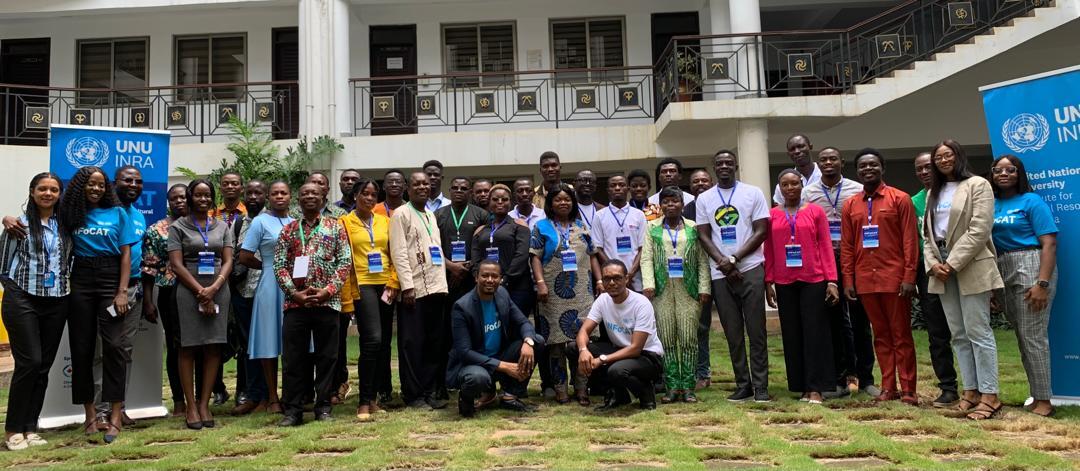By: Rosemary Balami, YRE News Ghana
The United Nations University Institute for Natural Resources in Africa (UNU-INRA) has hosted a groundbreaking capacity-building workshop in Accra as part of the Innovate for Clean Agricultural Technologies (INFoCAT) Innovation Challenge. The two-day event, titled “Empowering Innovators: Strategies for Sustainable Agri-tech Solutions,” brought together green entrepreneurs, researchers, and policymakers to foster collaboration and drive innovation in sustainable agriculture across Africa.

Group photo of participants
The workshop, held at the International House at the University of Ghana-Legon, aimed to equip participants with essential skills in design thinking, scaling innovations, and funding strategies, while also emphasizing the importance of gender inclusion in green entrepreneurship. According to Maria-Ancilla Bombande, a gender expert and researcher at UNU-INRA, the workshop was crucial for educating stakeholders on the need to involve more women in developing green agricultural technologies. “We need to include more women in developing clean agritech solutions, as they make up a significant portion of the agricultural sector, especially in Africa,” she stated during an interview.
Participants at the workshop, including Abdul Razak, founder of Governor Inspires, and Dr. Ferdinand Tornyie, the project coordinator for INFoCAT, highlighted the workshop's value in enhancing their knowledge and skills. Razak emphasized the role of women in driving innovation, particularly in the northern regions of Ghana, where women farmers face significant challenges. “Women are the driving force in tasks like these, and it is essential to include them in the system to bring their unique perspectives and solutions to the table,” he remarked.
Dr. Ferdinand Tornyie outlined the project's goal of empowering women economically by providing them with green technologies that reduce the labor and time required in agricultural activities. “The project is very much interested in women innovators, particularly in the agri-tech sector, where renewable energy-powered technologies can significantly reduce the effort and time spent on farming activities,” he explained.
The INFoCAT project, which spans across three countries in Africa including Ghana, Senegal, and Côte d'Ivoire, has shortlisted 30 innovators with promising ideas, who are now being trained to refine their technologies. These innovators will have the opportunity to pitch their solutions, with the top ten receiving funding and mentorship to further develop their projects. The best technology in each country will receive a seed fund of $34,000, along with opportunities to promote their innovations on larger platforms across Africa and globally.
The workshop also served as a platform for stakeholders to discuss the challenges faced by women in the agri-tech sector and explore ways to overcome them. “In Ghana, traditional setups often pose challenges to women’s participation in innovation and entrepreneurship, but we must use these challenges as motivation to push for greater inclusion,” Razak added.
The event concluded with a call to action for greater investment in green startups, particularly those led by women, as they hold the potential to drive significant change in the agricultural sector and contribute to global efforts to reduce carbon emissions.